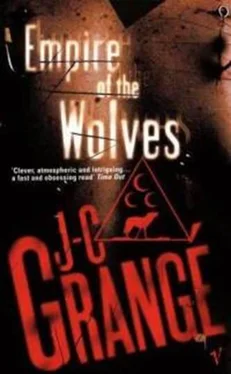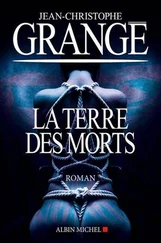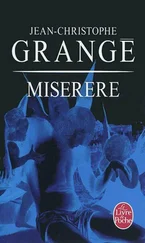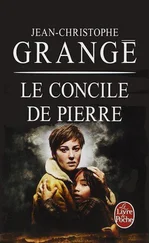"Right now, this won't be much fun for her," Ackermann went on, taking another drag. "The various levels of her consciousness are going to telescope. Sometimes she won't be able to tell the difference between what is true and what is false. But her original memory will slowly begin to dominate. With flumazenil, there are also risks of convulsions, but I've given her a little something to reduce the side effects…"
Mathilde pushed back her hair. She must look like a ghost. "What about the faces?"
He chased away the smoke with a vague gesture. "That should sort itself out, too. Her reference points are going to become more fixed. When her memory returns, her reactions should become more stable. But I repeat: all of this is extremely new and-"
Mathilde noticed a movement behind the window. She rushed at once into the room. Anna was already sitting on the table of the PET scanner, her legs dangling down, leaning back on her hands. "How do you feel?"
A smile flickered over her face. Her pale lips barely stood out from her skin. Ackermann came back and turned off the last of the machines. "How do you feel?" Mathilde repeated.
Anna glanced at her in hesitation. Mathilde understood at once. This was no longer the same person. Those indigo eyes were smiling at her from inside a different consciousness. "Got a cigarette?" she asked, in a voice that was seeking normal range.
Mathilde handed her a Marlboro. She looked at the slender hand that took it. It was almost as if she could see that henna as a filigree. Flowers, spikes and snakes curling around a clenched fist. A tattooed fist, holding an automatic pistol.
Behind the mist of smoke, the woman with the dark bangs murmured, "I would rather have been Anna Heymes."
Falmières railway station, six miles west of Reims. was a solitary building, dropped alongside the tracks in the middle of the countryside. A millstone building stuck between the black horizon and the silence of the night. Yet with its small yellow lantern and laminated glass umbrella roof, it had a reassuring look about it. Its slates, its walls divided into two blue and white bands and its wooden fences gave it the appearance of a shiny toy from an electric train set.
Mathilde braked in the garage.
Eric Ackermann had asked them to drop him off at a station. Any one will do, I'll manage."
Since they had left the hospital. no one had said a word. But the quality of the silence had changed. The hatred, anger and defiance had melted away, and a strange sort of complicity had even started up among the three fugitives.
Mathilde turned off the motor. In the rearview mirror, she could see the neurologist's pale face, like a shard of nickel on the backseat. They got out together.
Outside, the wind had risen. Violent gusts were slapping against the asphalt. In the distance, jagged clouds were drifting away like a battalion armed with spears, revealing an extremely pure moon-a large fruit with blue pulp.
Mathilde buttoned up her coat. She would have given anything for a tube of moisturizing cream. It felt as if each squall were drying her skin, digging deeper into the wrinkles on her face.
They walked as far as the flowered fence, still without a word. It made her think of an exchange of hostages during the Cold War, on a bridge in old Berlin there was no way to say good-bye.
Anna suddenly asked, "What about Laurent?"
She had already asked that question in the garage under Place d'Anvers. It was another aspect of her story: the revelation of a love that persisted despite such betrayal, lies and cruelty.
Ackermann seemed too tired to lie. "To be honest, there's little chance he's still alive. Charlier won't leave any traces. And Heymes was unreliable. He would have cracked as soon as anyone questioned him. He might even have gone so far as to turn himself in. Since the death of his wife, he…" The neurologist paused.
For a moment, Anna seemed to be standing up to the wind; then her shoulders slumped. She turned around silently and returned to the car.
Mathilde took a final look at the lanky frame, topped with a flaming red mane, awash in its raincoat.
"And you?" she asked, almost in pity.
"I'm going to Alsace, to lose myself amid all the other Ackermann." A sardonic laugh shook his frame. Then he added, in a lyrical gush, "And then I shall find another destination. The roving life for me!"
Mathilde did not respond. He swayed, hugging his bag against his chest. Just as he used to be at the university. He half opened his mouth, hesitated, then murmured, "Anyway, thanks…"
He flicked his index finger in a cowboy salute and turned around toward the isolated station, holding his arms up against the wind.
Where on earth could he go? And then I shall find another destination. The roving life for me! Was he talking about a place ()dearth or a fresh region of the brain?
"Drugs."
Mathilde was focusing on the white lines of the highway, which were shooting past rapidly. They flashed in front of her eyes, as some sorts of plankton shine at night in the wakes of ships. A few seconds later, she glanced over at her passenger. Her face was like chalk, smooth, inscrutable.
"I'm a drug runner," Anna went on in a neutral tone. "A smuggler. A supplier for the big dealers. A go-between."
Mathilde nodded, as though she had been expecting this revelation. In fact, she was ready for anything. There were no limits to the truth. That night, each new step revealed dizzying gulfs. She turned her attention back to the road. Several long seconds passed before she asked, "What kind of drugs? Heroin? Cocaine? Amphetamines? What?" By the time she had finished, she was almost yelling. She gripped the steering wheel. Calm down-at once.
"Heroin. Only heroin. Several kilos on each trip. Never more. From Turkey to Europe. On me. In my luggage. Or by other means. There are the tricks of the trade. My job was to know them. All of them."
Mathilde's throat was so dry that each breath was agony. "Who… who were you working for?"
"The rules have changed, Mathilde. The less you know, the better." Anna's tone was now strange, almost condescending.
"What's your real name?"
"I have no real name. That's part of the job."
"How did you work? Give me some details."
Anna remained silent for a long time, as impervious as marble. Then, after an extended pause, she went on. "It wasn't really an exciting life. Growing old in airports. Knowing the best stopovers. The least well guarded borders. The simplest-or else the most complicated-connecting flights. The towns where your bags are left on the runway. The customs posts where you're searched, and the ones where you aren't. The structure of holds. Places of transit."
Mathilde listened but paid attention mostly to the timbre of Anna's voice. Never had it rung so true.
"A schizophrenic lifestyle. Constantly speaking different languages, answering to different names, having several nationalities. And your only home the standard comfort of VIP lounges in airports. And always, everywhere, fear."
Mathilde blinked away the sleep. Her eyesight was getting hazy. The lines on the road were floating, drifting apart… She asked again, "Where are you from exactly?"
"I can't remember yet. But it will come back, I'm sure of it. For the moment, I'm concentrating on the present."
"So what happened? Why were you in Paris posing as a working girl? Why did you alter your appearance?"
"It's a classic story. I wanted to hold on to my last consignment. To rob my employers."
She paused. Each memory seemed to cost her an effort.
"It was in June, last year. I had a delivery to make in Paris. A special load. Extremely precious. I had a contact here, but I chose a different route. I hid the heroin and went to see a plastic surgeon. I think… yes, I think that at the time, I had a good chance. But during my convalescence, something unexpected happened. Something no one expected: the attacks on September ii. From one day to the next, borders turned into solid walls. So there was no way I was going to leave with the dope as planned. Nor could I leave Paris. I had to stay there and wait for the situation to calm down, while knowing that my bosses would do everything to find me… So I hid where, normally speaking, no one would look for a Turk who was hiding out: among the Turks. With the illegal immigrant workers in the tenth arrondissement. I had a new face, and a new identity. No one would spot me."
Читать дальше












